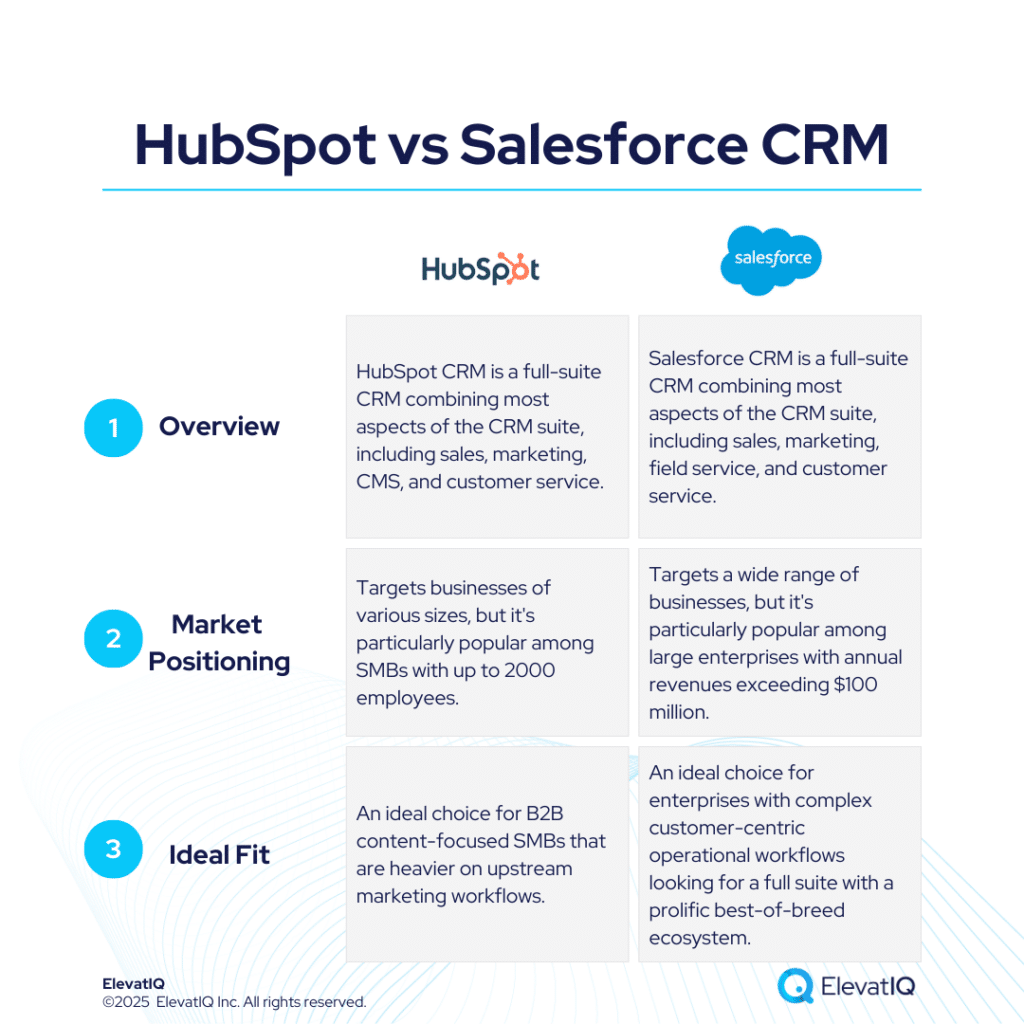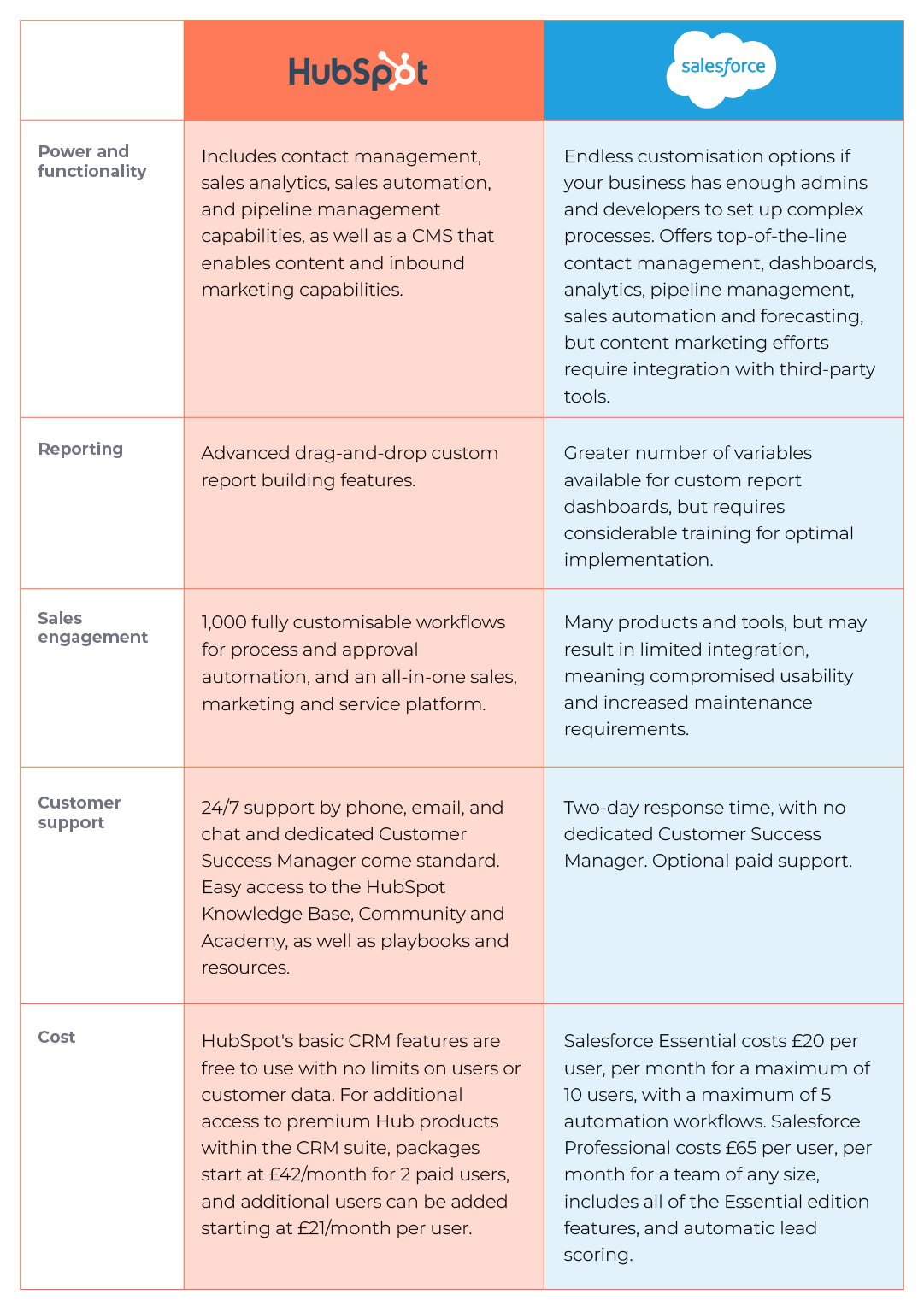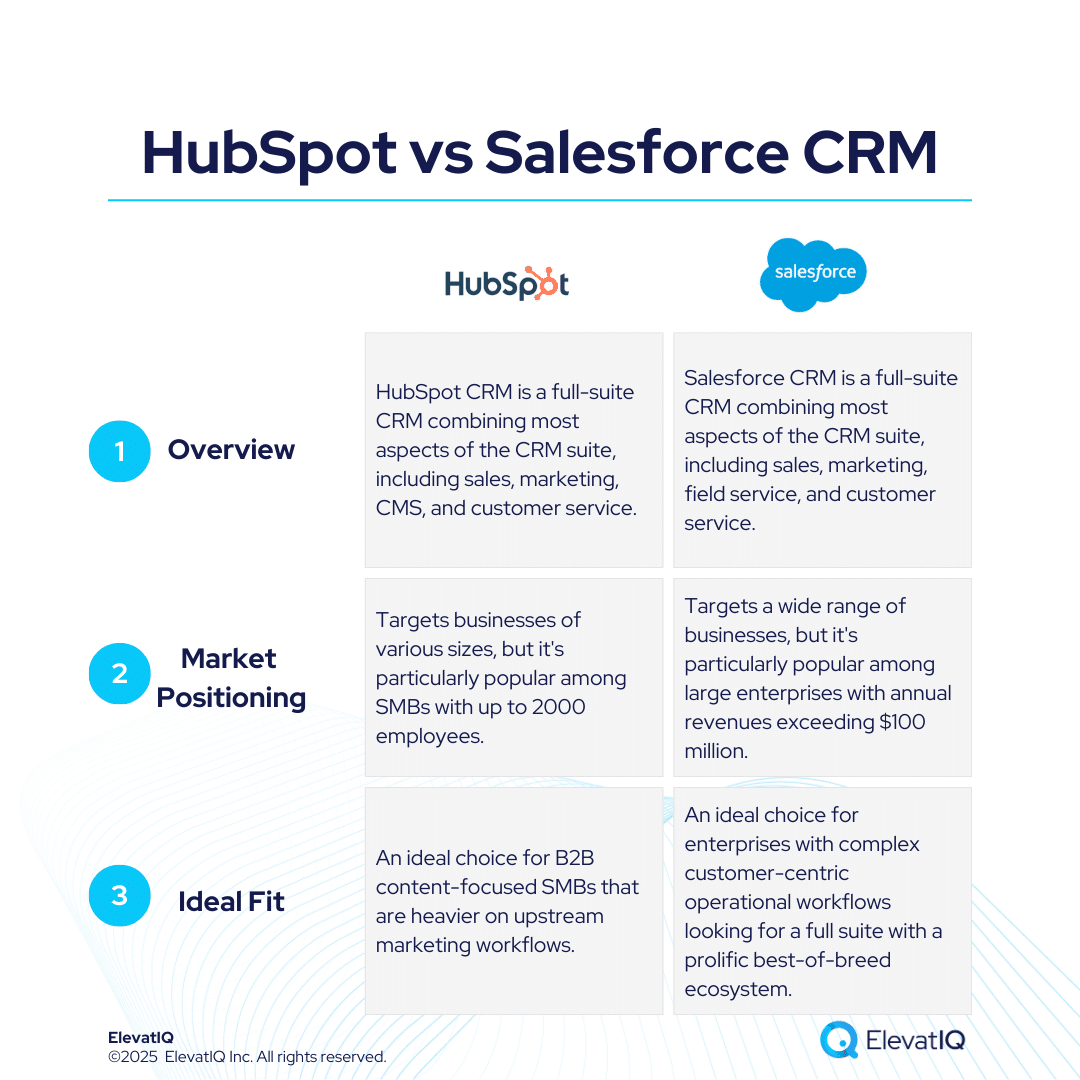HubSpot and Salesforce are two of the top CRM tools for sales. Both offer unique features and benefits.
Choosing the right CRM can make a big difference for your sales team. HubSpot and Salesforce are popular options, but which is better for sales? Understanding their strengths and weaknesses can help you decide. This comparison will guide you through the key features, ease of use, pricing, and support of both CRMs.
By the end, you’ll have a clearer picture of which one fits your sales strategy best. Let’s dive into the details and see which CRM stands out.
Ease Of Use
When choosing a CRM for sales, ease of use is crucial. A user-friendly CRM boosts productivity and efficiency. Let’s compare Hubspot and Salesforce in terms of ease of use.
User Interface
Hubspot has a clean and intuitive user interface. It is easy to navigate. The design is simple yet effective. Users can quickly find what they need. The dashboard is customizable. It shows essential metrics at a glance.
Salesforce offers a robust user interface. It is highly customizable. However, it can be overwhelming for new users. The layout is complex. It provides many features and options. This can be confusing for beginners.
Onboarding Process
Hubspot excels in its onboarding process. It offers guided tutorials. Users receive step-by-step instructions. This helps them get started quickly. The learning curve is minimal.
Salesforce’s onboarding process is detailed. It provides extensive resources. Users have access to training modules. However, it takes time to learn. The process can be lengthy for some users.

Credit: www.elevatiq.com
Features
When it comes to choosing between HubSpot and Salesforce for your sales team, the decision often boils down to the features each CRM offers. Both platforms are robust and designed to enhance sales processes, but they cater to different needs and business scales. Let’s delve into the key features of each CRM to help you make an informed choice.
Sales Automation
Sales automation is a critical component of any CRM, as it streamlines repetitive tasks and helps sales teams focus on closing deals. HubSpot and Salesforce both excel in this area, but they approach it differently.
| Feature | HubSpot | Salesforce |
|---|---|---|
| Lead Scoring | Included in all tiers | Advanced but comes with higher tiers |
| Email Tracking | Real-time notifications | Comprehensive tracking with detailed analytics |
| Workflow Automation | User-friendly and easy to set up | Highly customizable but requires more setup |
HubSpot is known for its user-friendly interface and simplicity. This makes it great for small to medium-sized businesses. On the other hand, Salesforce offers advanced customization and can handle complex sales processes, which is ideal for larger enterprises.
Customer Support Tools
Customer support is the backbone of any CRM, ensuring that your team can resolve issues promptly and keep customers satisfied. Let’s compare the support tools offered by HubSpot and Salesforce.
- HubSpot:
- Integrated help desk
- Knowledge base
- Live chat and bots
- Ticketing system
- Salesforce:
- Case management
- Service Cloud for comprehensive support
- Omni-channel routing
- Self-service portals
HubSpot shines with its all-in-one solution, providing everything you need without a steep learning curve. Its support tools are designed for immediate use, making it perfect for teams that need to get up to speed quickly. Meanwhile, Salesforce’s Service Cloud offers a deep, customizable support experience. It is highly effective for businesses with complex support needs and larger support teams.
In conclusion, the choice between HubSpot and Salesforce depends on your business size and specific needs. Small to medium-sized businesses might find HubSpot’s features more intuitive and accessible, while larger enterprises might benefit from Salesforce’s advanced customization and comprehensive support tools. Both CRMs are powerful in their own right, so consider your business requirements carefully before making a decision.
Customization
When it comes to choosing the right CRM for your sales team, customization is a key factor. Both Hubspot and Salesforce offer unique customization options, but which one stands out? Let’s dive into the specifics and see how they measure up.
Flexibility
One size doesn’t fit all, especially in sales. Flexibility in customization means you can tailor the CRM to fit your unique business processes. Hubspot provides a user-friendly interface that allows you to easily drag and drop modules, creating a personalized dashboard without needing a tech guru.
On the flip side, Salesforce is like a Swiss Army knife. It offers deep customization options, but it might require some technical know-how. Think of it as a blank canvas for your sales operations, where you can build complex workflows and automate tasks to fit your exact needs. However, be prepared to spend some time (and possibly money) on setting it up.
Integration Capabilities
Integration is crucial for a seamless sales process. Hubspot shines with its robust integration ecosystem. It connects effortlessly with popular tools like Gmail, Outlook, Slack, and many more. This integration ensures your sales team can work without interruption and keeps all data in one place.
Salesforce, however, takes integration to the next level. It offers an extensive AppExchange marketplace with thousands of apps and integrations. Whether you need project management tools, marketing automation, or even custom-built solutions, Salesforce has you covered. Plus, its APIs allow for custom integrations, making it a powerful ally for tech-savvy teams.
| Feature | Hubspot | Salesforce |
|---|---|---|
| Ease of Use | High | Moderate |
| Customization Level | Medium | High |
| Integration Options | Robust | Extensive |
In summary, both Hubspot and Salesforce offer strong customization capabilities, but they cater to different needs. Hubspot is ideal for those who want simplicity and ease of use, while Salesforce is perfect for those who need extensive customization and powerful integrations. Consider your team’s technical expertise and business requirements when making your choice. After all, the best CRM is the one that fits your unique sales process.

Credit: www.inboundfintech.com
Pricing
Pricing is a crucial factor when choosing a CRM for your sales team. HubSpot and Salesforce offer different pricing structures. Understanding these can help you make the right choice.
Subscription Plans
HubSpot offers a free tier with basic features. This is great for small teams. Their paid plans start at $45 per month. Each plan offers more advanced features as the price increases.
Salesforce does not have a free tier. Their plans start at $25 per user per month. These plans are scalable. They suit larger organizations with specific needs.
Hidden Costs
HubSpot’s free plan is appealing. But, you might need to upgrade for advanced features. This can lead to unexpected costs. Integration with other tools may also add to your expenses.
Salesforce has a reputation for being complex. You might need to spend on training and customization. These costs can add up. Be sure to consider this when budgeting.
Scalability
Scalability is a crucial factor in choosing a CRM for your business. It determines how well the software can grow with your company. Both HubSpot and Salesforce offer scalable solutions, but they cater to different business needs.
Small Businesses
HubSpot is a great choice for small businesses. It offers a free version with limited features. This allows small teams to get started without a big investment. HubSpot’s user-friendly interface makes it easy to adopt. You can upgrade to paid plans as your business grows.
Salesforce can be complex for small businesses. It offers a lot of customization options. But, it comes with a steeper learning curve. The cost can be a barrier for smaller teams. Salesforce is better suited for companies with dedicated IT staff.
Large Enterprises
Salesforce shines in serving large enterprises. It offers extensive customization and integration options. Large companies can tailor Salesforce to fit their specific needs. Salesforce supports complex sales processes and large teams.
HubSpot can also serve large enterprises. But, it might not offer the same level of customization as Salesforce. HubSpot focuses on ease of use and straightforward features. This can be a limitation for highly complex needs.

Credit: www.elevatiq.com
Customer Support
When choosing between HubSpot and Salesforce, one of the crucial aspects to consider is Customer Support. Customer support can make or break your experience with any CRM platform. Whether you are a small business or a large enterprise, having reliable support is essential. Let’s dive into the specifics of customer support for both HubSpot and Salesforce under the following headings:
Availability
When it comes to availability, both HubSpot and Salesforce offer robust support systems. However, there are some differences worth noting:
| Feature | HubSpot | Salesforce |
|---|---|---|
| 24/7 Support | Yes, for Enterprise users | Yes |
| Email Support | Yes | Yes |
| Phone Support | Yes, for paid plans | Yes |
| Live Chat | Yes | Limited |
HubSpot provides 24/7 support mainly for its Enterprise users, while Salesforce offers 24/7 support across the board. Both platforms offer email and phone support, but HubSpot has an edge with its live chat feature, which is available to all users.
Quality Of Service
Quality of service is another critical factor. After all, you don’t just need support; you need good support. Here’s what you can expect:
- HubSpot: Users often rave about HubSpot’s friendly and responsive customer service. The support team is known for their quick turnaround times and thorough solutions. Whether you are on a free plan or a paid one, the team treats you with the same level of respect and urgency.
- Salesforce: Salesforce has a reputation for excellent support, but it’s a bit of a mixed bag. Some users report stellar experiences, while others find the support to be slow or less personalized. It really depends on your plan and the complexity of your issue. However, Salesforce does offer a wide range of support options, including a comprehensive knowledge base, community forums, and a dedicated success team for enterprise customers.
Personally, I’ve found HubSpot’s customer support to be more approachable. Once, I had an issue integrating a third-party app and HubSpot’s support team walked me through every step with patience. It felt like chatting with a friend who genuinely wanted to help. On the other hand, Salesforce support, while knowledgeable, can sometimes feel a bit formal and less personable.
In conclusion, both HubSpot and Salesforce offer strong customer support, but they do so in slightly different ways. If you value personalized, friendly support, HubSpot might be your go-to. If you need a wide array of support options and are okay with a more formal approach, Salesforce could be the better choice.
User Reviews
User reviews are a great way to understand how effective a CRM system is. They provide real-world experiences from people who use the software daily. Let’s look at what users say about Hubspot and Salesforce.
Positive Feedback
Many users praise Hubspot for its user-friendly interface. They find it easy to navigate, which helps them save time. Hubspot’s integration with other tools is also a highlight. Users appreciate how smoothly it connects with email, social media, and other apps.
Salesforce also receives positive feedback. Users like its robust customization options. They can tailor the CRM to fit their unique business needs. Salesforce’s powerful analytics tools are another plus. They help sales teams make data-driven decisions.
Common Complaints
Hubspot users often mention the cost of advanced features. While the basic version is free, more advanced tools can get pricey. Some users also find the reporting tools limited.
Salesforce users sometimes struggle with its complexity. The learning curve can be steep for new users. Some also point out that Salesforce can be expensive, especially for small businesses.
Frequently Asked Questions
Which Crm Is Better, Salesforce Or Hubspot?
Salesforce is ideal for large enterprises needing advanced customization. HubSpot suits small to mid-sized businesses seeking user-friendly features and affordability.
Is There A Better Crm Than Hubspot?
There isn’t a one-size-fits-all CRM. HubSpot is excellent, but alternatives like Salesforce or Zoho may better suit your needs.
Why Use Hubspot With Salesforce?
HubSpot integrates seamlessly with Salesforce, enhancing lead management, improving data synchronization, and boosting overall sales efficiency. Leverage powerful marketing automation and CRM capabilities for better business insights.
Is Salesforce Really The Best Crm?
Salesforce is widely regarded as a top CRM due to its robust features and scalability. Many businesses trust its capabilities.
Conclusion
Both HubSpot and Salesforce offer excellent CRM solutions. HubSpot is user-friendly and great for small businesses. Salesforce excels with advanced features and customization. Your choice depends on business needs and budget. Evaluate each platform’s strengths. Consider ease of use, scalability, and cost.
Test free trials to make an informed decision. The best CRM aligns with your sales goals. Choose wisely to boost efficiency and growth.

